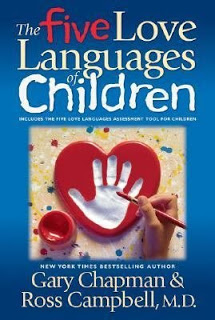
April Series Overview: The Five Love Languages of Children
This workshop comes from the book, Five Love Languages of Children by Dr. Gary Chapman. Thanks to Anderson Hills for sharing the information in a workshop format. This is based on a biblical idea that God loves his people in five ways, and therefore we give and receive love in these ways too.
Have you read…
The Five Love Languages of Children
It was mentioned in the workshop that it is tough to spot a love language in a child until around age 5, but you still may pick up clues. Use the following list to become fluent in your child’s language. This may be an adventure of trial an error!
Here are some ways to help…
1. Observe how a child expresses love to you.
2. Observe how a child expresses love to others.
3. Listen to what a child requests most often.
4. Listen to a child’s most frequent complaints.
5. Give child a choice between two love languages, and see what they choose.
Observing the Five Love Languages in Action
Words of Encouragement:
- Makes comments like, “Thanks for helping”, “I love you”, or “You’re the best daddy.”
- Enthusiastic greetings and farewells
- Loves to talk to you on the phone
- Keen to share news and hear yours
- Fishes for a compliment
- Might be jealous of others being praised more than her
- Gives compliments
- Will write cards and letters, and reads the ones she gets closely
Gift Giving:
- Takes an interest in other people’s gifts
- Makes little gifts for others
- May be critical of others lack of giving
- Will wrap and present presents carefully
- Will be hurt if their gift isn’t appreciated
- Will value and display gifts
- Always knows what she want for her birthday or Christmas
- Remembers and keep presents forever, even though used infrequently
- Give hints about presents
- Will be profoundly grieved if they loose a possession
Acts of Service
- Helps without being asked – just a nice thing to do
- May be very disappointed if you fail to do something for him that he expected you to do
- May be short on words but long on actions and activity
- Will appreciate assistance
- Loves to do jobs on a list
- Will expect appreciation
- Will tell you what she has done
- Love you to join in his activities
- Will be disappointed when others fail to help or participate
Quality time and attention
- Will love going out with you
- Will want you to play with you
- Will perform for an audience
- May annoy to get a response, including stirring up trouble with others
- Likes doing things together
- Enjoys talking to you
- Engages you with her eyes
- May try and monopolize you
- May compete for friendship
- Could feign sickness to get attention
- May be less of a “self-starter”, requiring motivation from others
- May create crisis to gain intervention
Physical closeness and touch
- Enjoy cuddling, often
- Likes playing rough and tumble games
- Moody if hug-starved
- Enjoys a massage or back scratch
- Jumps into bed with you
- Will take your hand even when she doesn’t have to
- May be inappropriate in his touching
- Likes to cuddle soft toys
- May lean on you
- Will play physically close
- May fiddle with laces, hair, etc.
- Will prefer sitting on your lap to sitting next to you in an armchair
Visit the Five Love Languages website, here.
Check in next week, Part #3 – How to Operate in Each of the Love Languages
(Showing individual love that children long to receive)

